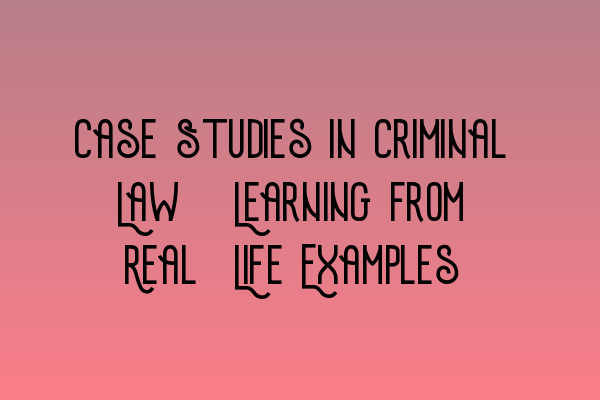Case Studies in Criminal Law: Learning from Real-Life Examples
As criminal law practitioners, it is essential to continuously learn and improve our understanding of the legal system. A great way to expand our knowledge and gain valuable insights is by studying real-life case studies. By examining actual criminal cases that have occurred in the past, we can better understand the intricacies of criminal law and learn from the experiences of others.
The Importance of Case Studies
Case studies provide us with practical examples of how criminal cases are handled in the real world. They give us a glimpse into the investigations, legal strategies, and courtroom proceedings involved in criminal prosecutions. By analyzing these case studies, we can identify successful defense tactics, understand common mistakes to avoid, and develop a comprehensive understanding of criminal law principles.
At SQE Criminal Law & Practice Law UK, we believe in the power of learning from real-life examples. That’s why we have compiled a collection of insightful case studies that cover various aspects of criminal law. Let’s explore some of these case studies and the valuable lessons they offer.
Case Study 1: The Famous Robbery Case
In this high-profile robbery case, the defendant was accused of orchestrating a daring heist at a prominent bank. The case involved complex forensic evidence, witness testimonies, and legal arguments surrounding search and seizure protocols. Through this case study, we gain insights into how the defense team strategically challenged the prosecution’s evidence and highlighted flaws in the investigation. This case reinforces the importance of thorough preparation, attention to detail, and expert witness testimony.
Case Study 2: The Controversial Self-Defense Case
This case study delves into a self-defense scenario where the accused allegedly used excessive force to protect themselves. The trial centered around the defendant’s justification for their actions and the boundaries of self-defense within the law. Examining this case provides valuable insights into the legal principles of self-defense, the burden of proof in such cases, and the significance of gathering supporting evidence. It emphasizes the importance of building a strong defense strategy based on a solid understanding of relevant legal precedents.
Case Study 3: The Infamous White-Collar Crime
White-collar crimes present unique challenges in criminal law, as they often involve complex financial transactions and intricate legal arguments. This case study explores a high-profile fraud case that exposed corporate misconduct. By analyzing this case, we can learn about the roles of forensic accountants, the importance of expert testimony, and the strategies employed in proving intent. It highlights the need for in-depth knowledge of corporate regulations and financial practices in tackling white-collar crimes.
Case Study 4: The Landmark Human Rights Case
This case study focuses on a landmark human rights case where the accused’s constitutional rights were violated during the investigation. The trial revolved around the legality of the evidence obtained through an unlawful search and seizure process. Studying this case provides crucial insights into the protection of individual rights, the exclusionary rule, and the role of judicial review in safeguarding fundamental liberties. It emphasizes the importance of upholding human rights principles in criminal proceedings.
Conclusion
Case studies in criminal law offer valuable lessons that can enhance our legal knowledge and improve our practice. By studying real-life examples, we can better understand the intricacies of criminal cases and gain insights into successful defense strategies. At SQE Criminal Law & Practice Law UK, we encourage all aspiring and practicing criminal law professionals to delve into the world of case studies and learn from the experiences of others. Together, let’s strengthen our legal expertise and strive for justice.
For additional resources and preparation materials related to SQE exams, check out these articles:
